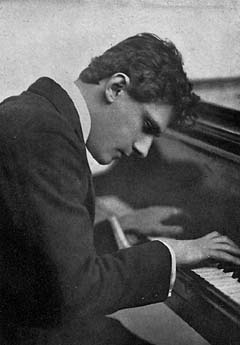1.
Improvisation is terribly haphazard.
Leo Ornstein
2.
To the person that deals in visualizations, I suppose there is something rather exciting about a whole set of people - they all going symmetrically, up or down, in a military sort of precision.
Leo Ornstein
3.
Today each composer is not only involved in aesthetics, but he's actually trying to create his own language.
Leo Ornstein
4.
The difference between the student and the born composer is he really hears the thing, and they have to stage it and manipulate it by technical equipment.
Leo Ornstein
5.
I distrust anything that you don't hear.
Leo Ornstein
6.
Of all the arts, music is really the most abstract.
Leo Ornstein
7.
It doesn't necessarily mean at all that the composer plays his own works best.
Leo Ornstein
8.
Because essentially Schoenberg was an extremely gifted man. And in spite of many of his theories and so on, when he really began to write music, he still was guided very much by his internal hearing, by what we call your internal ear.
Leo Ornstein
9.
There are some people, by the way, that associate a certain amount of visualization with the performance of music. Those are people that really are not centrally concerned only with music, the traditional things.
Leo Ornstein
10.
Besides merely some pleasure that we get out of the combinations of pitches together and lines, I think that there is some satisfaction that we get in the fact of having this diffuse thing organized very concretely and put onto a frame and have it actually decided.
Leo Ornstein
11.
By the visual pattern, but mostly I'm guided entirely by my ear, what I hear.
Leo Ornstein
12.
Hopefully, I have a certain amount of what you call musical talent.
Leo Ornstein
13.
I think there have been some periods when the writing almost became a bit of a burden.
Leo Ornstein
14.
But in the end, music is ultimately an aural art, pure and simple.
Leo Ornstein
15.
A person improvising is sometimes very fortunate that just at that second things coincide.
Leo Ornstein
16.
You write it down because finally, when it's written down you do get it out of your system somewhat.
Leo Ornstein
17.
Now, what we are not talking about, what you're really coming to, is what compromises one makes so that the listener understands somewhat of what you're doing, what you're trying to express.
Leo Ornstein
18.
Now, there are sometimes making a connection between one section and another that sometimes you do want to see the pattern because it helps you to lead into the next thing - it's a rhetorical thing, where you just see how the pattern has to go into the next thing.
Leo Ornstein
19.
No, I think that a person writes a poem because they have an inner urge of something that they want to express, and I think it's that inner urge that you want to express when you write a piece of music.
Leo Ornstein
20.
I'm really interested in writing a piece of music that will move you, that will really move you. That is really the only reason that I'm writing music.
Leo Ornstein
21.
In writing music, the structure of each piece is a very important factor.
Leo Ornstein
22.
When I was speaking about communicating, I meant that the listener - we have to reach the listener; otherwise, of course, you're writing the piece, as I say, only for the satisfaction of seeing it on the paper for yourself, and then it ends right there.
Leo Ornstein
23.
By the way, the point between rationality and what we would call the irrational is a very difficult point to establish. There’s no specific line, as you know.
Leo Ornstein
24.
We can use techniques in modifying things, in controlling things, but the first impulse has to be something that you simply cannot make just out of technique, or else it becomes perfectly evident that it is nothing but technique that you're exercising.
Leo Ornstein
25.
I think recordings have been a terrific advance because now, when you have a piece of music, particularly something that appears to the listener very complicated, there's really a push to the world to try to figure out what it was that he was hearing.
Leo Ornstein

